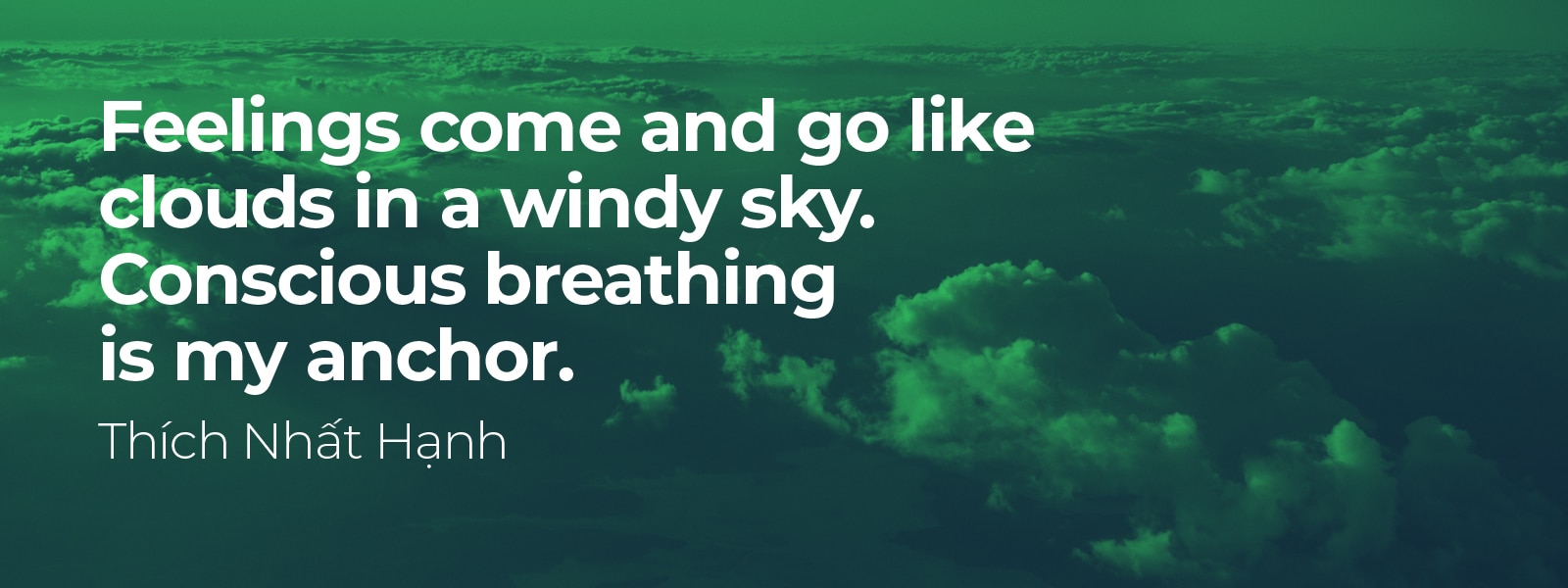 "Feelings come and go like clouds in a windy sky. Conscious breathing is my anchor." - Thich Nhat Hanh
Do you ever feel like your mind is too full? Maybe you’re struggling to concentrate and achieve your goals? You need mindfulness. Why? The more you practice being mindful, the less your mind... is... full... There is logic to it and in this blog, we’ll talk you through the basics step by step. With tips from our Mindfulness course tutors, we've compiled the beginner's guide to mindfulness.
But what is Mindfulness? It is an Eastern meditation practice originating in Buddhism, believed to improve mental and physical well-being. Now, it’s natural to be curious but sceptical. You might be thinking, what’s the cost? What’s the catch? The truth is that with mindfulness there’s no trick to the trade, it’s as simple as you want it to be, with unlimited reward. And guess what? You don’t need to live in yoga leggings and sip green tea all day to practice it...
"Feelings come and go like clouds in a windy sky. Conscious breathing is my anchor." - Thich Nhat Hanh
Do you ever feel like your mind is too full? Maybe you’re struggling to concentrate and achieve your goals? You need mindfulness. Why? The more you practice being mindful, the less your mind... is... full... There is logic to it and in this blog, we’ll talk you through the basics step by step. With tips from our Mindfulness course tutors, we've compiled the beginner's guide to mindfulness.
But what is Mindfulness? It is an Eastern meditation practice originating in Buddhism, believed to improve mental and physical well-being. Now, it’s natural to be curious but sceptical. You might be thinking, what’s the cost? What’s the catch? The truth is that with mindfulness there’s no trick to the trade, it’s as simple as you want it to be, with unlimited reward. And guess what? You don’t need to live in yoga leggings and sip green tea all day to practice it...
Coping in a Crisis
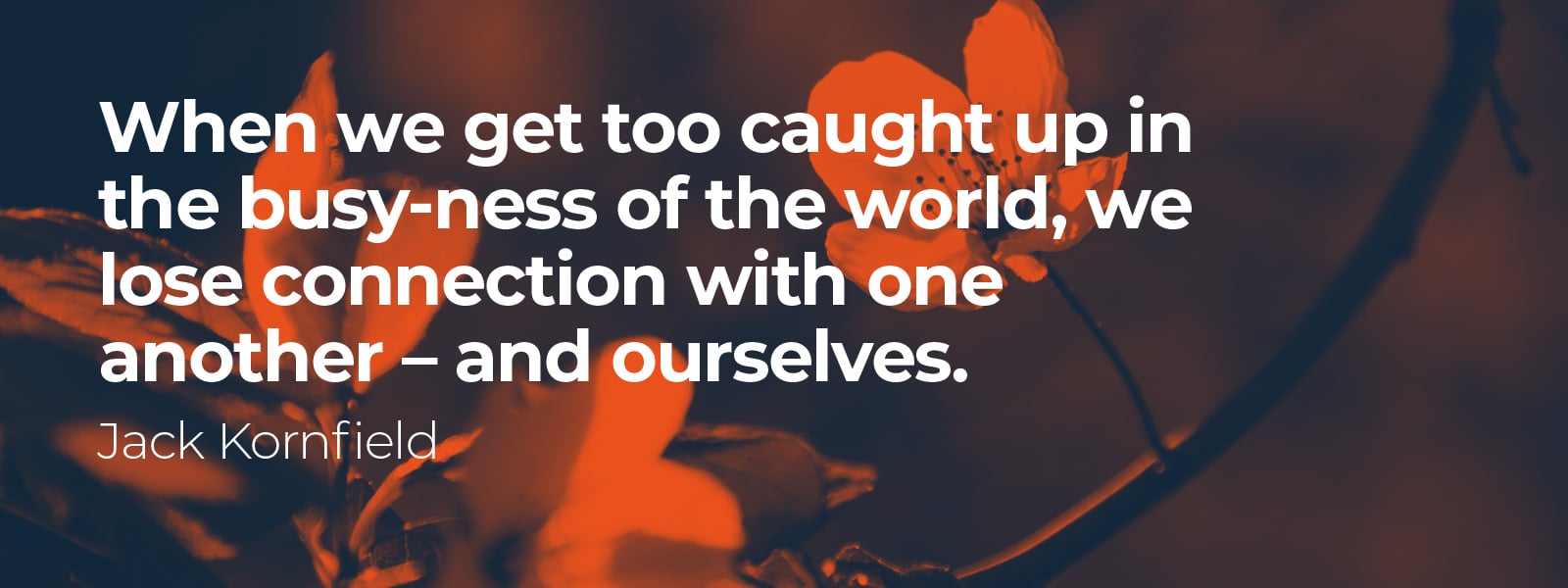 “When we get too caught up in the busy-ness of the world, we lose connection with one another – and ourselves.” – Jack Kornfield
Concentrating on important information and holding it in your mind is a useful skill to have in a world wrought with information overload. Too often, we cope with overwhelming stimuli by living on autopilot mode. Anxiety occurs when you try to control what’s happening around you. The only thing that you have control over is what happens inside you. And it all starts within your mind.
The brain is an incredibly powerful computer, reminding the lungs to inhale and exhale, telling the heart to pump and regulating your body temperature all without you even thinking about it. It just knows what to do. The problem is the rest is pretty much up to you. You get to decide what you pay attention to, and that can be overwhelming.
“When we get too caught up in the busy-ness of the world, we lose connection with one another – and ourselves.” – Jack Kornfield
Concentrating on important information and holding it in your mind is a useful skill to have in a world wrought with information overload. Too often, we cope with overwhelming stimuli by living on autopilot mode. Anxiety occurs when you try to control what’s happening around you. The only thing that you have control over is what happens inside you. And it all starts within your mind.
The brain is an incredibly powerful computer, reminding the lungs to inhale and exhale, telling the heart to pump and regulating your body temperature all without you even thinking about it. It just knows what to do. The problem is the rest is pretty much up to you. You get to decide what you pay attention to, and that can be overwhelming.
Living Through a Pandemic
Unless you’ve been living under a rock, you’ll know that there is a world pandemic happening. The Covid_19 outbreak has seen more news reporting and social media mentions than any world crisis ever has. For many, this may trigger anxiety, depression, loneliness and PTSD, amongst other mental illnesses. On the positive side, the whole world is slowing down, self-reflecting and spending time with themselves – a perfect opportunity to learn mindfulness. A skill that can help anyone cope with a crisis. Once mastered, practising mindfulness during everyday activities can become a useful stress management tool, even for those who think they don’t have time for it.Silencing Your Inner Critic
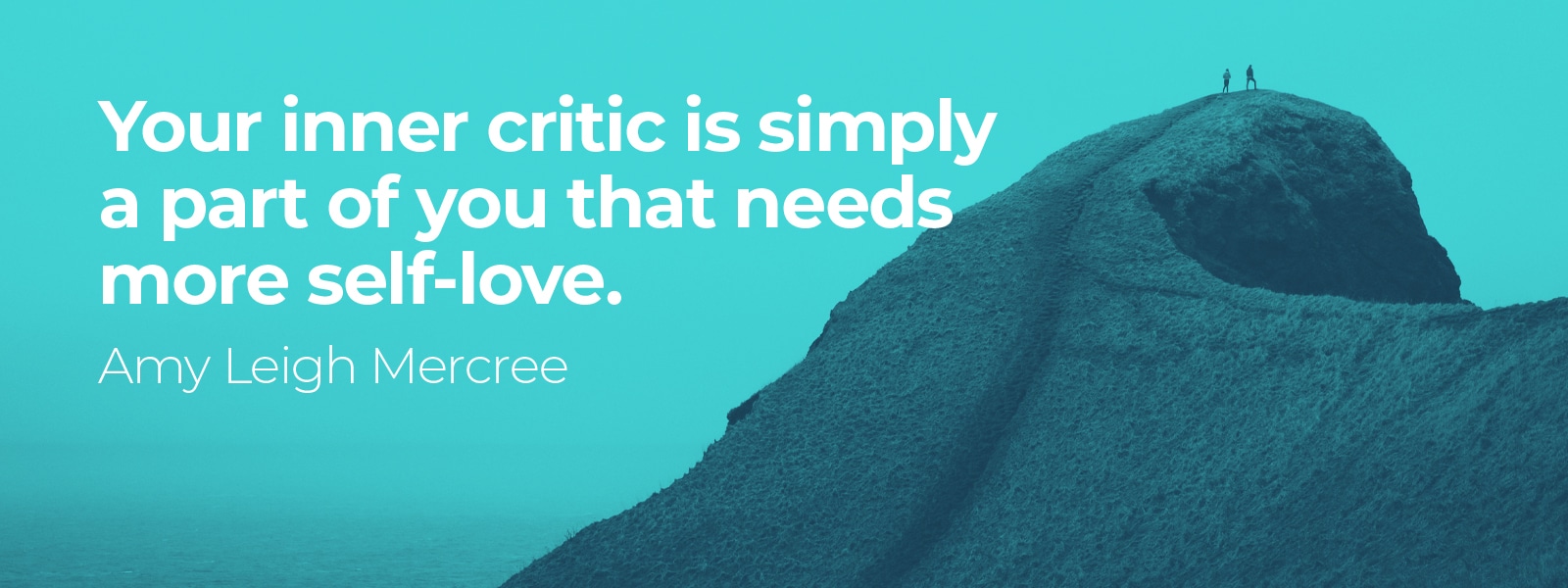 “Your inner critic is simply a part of you that needs more self-love.” ― Amy Leigh Mercree
It’s not just about coping with the outside world. Mindfulness can greatly improve the relationship you have with yourself, too. It silences your inner critic and brings you closer to a peaceful acceptance of self. Most of us have an inner narrative that comments on everything we do. It’s that ever-present voice in your head that acts as judgement, setting your standards and expectations.
It’s also stuck in the past, connecting your life with memories and old thoughts or habits at every crossroads. At the same time, that pesky voice makes assumptions about future scenarios you really know nothing about. It never stops! That can be exhausting.
Imagine if you could switch your inner voice off for a few minutes. The energy that it takes to do all that thinking would be saved. In fact, you could save an abundance of energy just by taking a break from all that backward and forwards thought-bouncing. Empty your mind and become mind-FULL of the present moment. Full of energy. Whether you’re brushing your teeth, washing the dishes or making a coffee at work, short mindful minutes can make all the difference.
“Your inner critic is simply a part of you that needs more self-love.” ― Amy Leigh Mercree
It’s not just about coping with the outside world. Mindfulness can greatly improve the relationship you have with yourself, too. It silences your inner critic and brings you closer to a peaceful acceptance of self. Most of us have an inner narrative that comments on everything we do. It’s that ever-present voice in your head that acts as judgement, setting your standards and expectations.
It’s also stuck in the past, connecting your life with memories and old thoughts or habits at every crossroads. At the same time, that pesky voice makes assumptions about future scenarios you really know nothing about. It never stops! That can be exhausting.
Imagine if you could switch your inner voice off for a few minutes. The energy that it takes to do all that thinking would be saved. In fact, you could save an abundance of energy just by taking a break from all that backward and forwards thought-bouncing. Empty your mind and become mind-FULL of the present moment. Full of energy. Whether you’re brushing your teeth, washing the dishes or making a coffee at work, short mindful minutes can make all the difference.
The Principles of Mindfulness
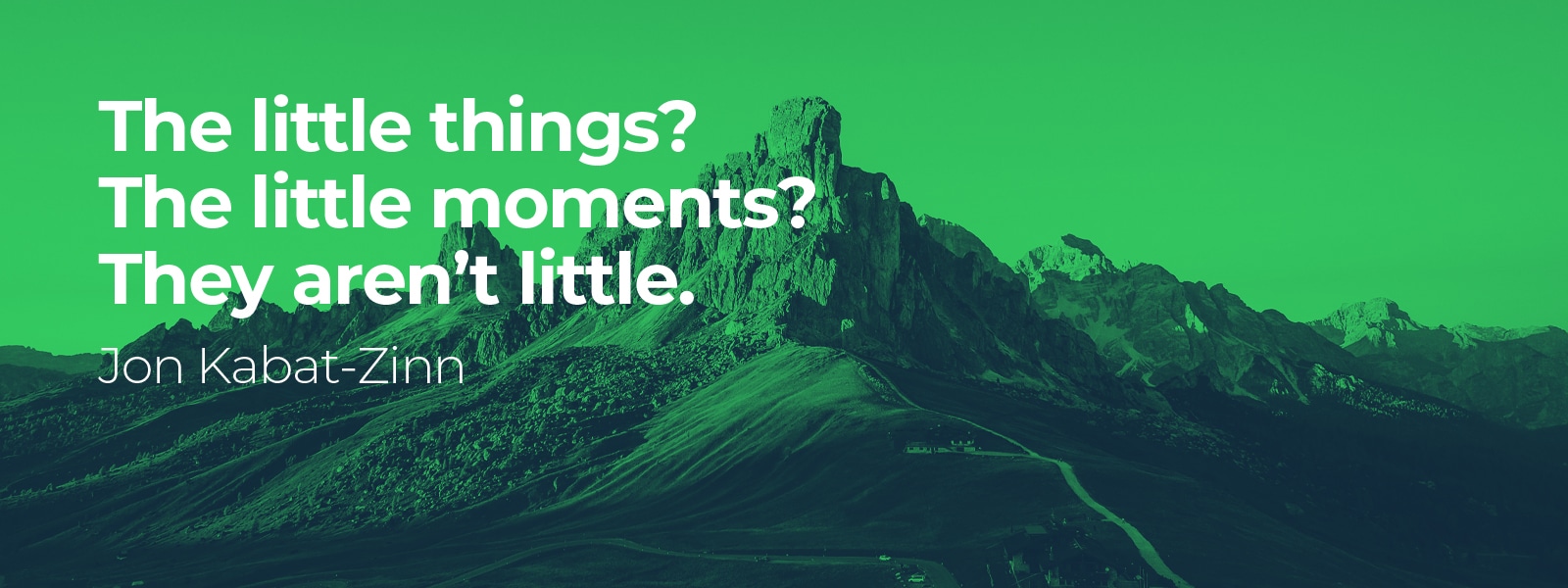 “The little things? The little moments? They aren’t little.” – Jon Kabat-Zinn
Ok, let’s break it down. Mindfulness is not for those who desperately need it. In fact, in many ways, meditative practices can be preventative holistic medicine. It helps you remain in good health before you need medical intervention.
Most meditations begin by sitting in a quiet place, closing your eyes, calming your mind, and simply focusing on your breath. Counting in and out, slowing down. But there’s more to meditating than sitting quietly and breathing. When you meditate, you’re simply cultivating awareness; using the breath to anchor you to each moment, thoughts and feelings can come and go without you being distracted by them.
“The little things? The little moments? They aren’t little.” – Jon Kabat-Zinn
Ok, let’s break it down. Mindfulness is not for those who desperately need it. In fact, in many ways, meditative practices can be preventative holistic medicine. It helps you remain in good health before you need medical intervention.
Most meditations begin by sitting in a quiet place, closing your eyes, calming your mind, and simply focusing on your breath. Counting in and out, slowing down. But there’s more to meditating than sitting quietly and breathing. When you meditate, you’re simply cultivating awareness; using the breath to anchor you to each moment, thoughts and feelings can come and go without you being distracted by them.
Awareness
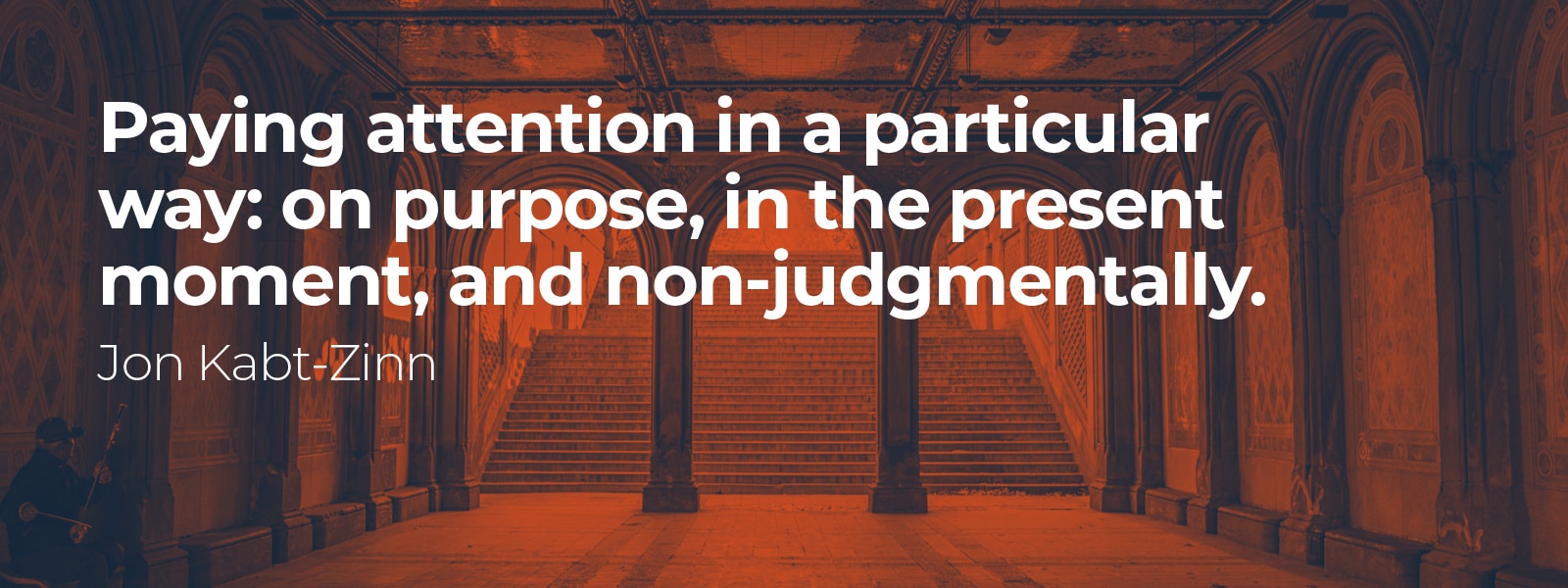 “Paying attention in a particular way: on purpose, in the present moment, and non-judgmentally.” - Jon Kabt-Zinn.
You don’t have to sit cross-legged, eyes closed, humming repeatedly. The key is to find awareness in the moment, whilst withholding all judgement from your inner critic. Let's say you’re outside and you become aware of the temperature. Judgement might interfere, comparing this warmth to the sunshine you experienced on holiday last July. Then your mind wanders to the cocktails and the memories. The present moment is lost. If you can simply notice the touch of the sun on your skin and empty your mind of anything else, you can harness the power of awareness.
By paying attention to your senses, you experience complete embodiment. Sight, touch, smell, and taste, all keep us aware of the present so that we can acknowledge what they tell us, rather than overthinking what their signals actually mean. Practising awareness of your body without diverting your thoughts during everyday activities will preserve your energy and calm your mind. It keeps you grounded.
“Paying attention in a particular way: on purpose, in the present moment, and non-judgmentally.” - Jon Kabt-Zinn.
You don’t have to sit cross-legged, eyes closed, humming repeatedly. The key is to find awareness in the moment, whilst withholding all judgement from your inner critic. Let's say you’re outside and you become aware of the temperature. Judgement might interfere, comparing this warmth to the sunshine you experienced on holiday last July. Then your mind wanders to the cocktails and the memories. The present moment is lost. If you can simply notice the touch of the sun on your skin and empty your mind of anything else, you can harness the power of awareness.
By paying attention to your senses, you experience complete embodiment. Sight, touch, smell, and taste, all keep us aware of the present so that we can acknowledge what they tell us, rather than overthinking what their signals actually mean. Practising awareness of your body without diverting your thoughts during everyday activities will preserve your energy and calm your mind. It keeps you grounded.
Changing Outcomes with Intention
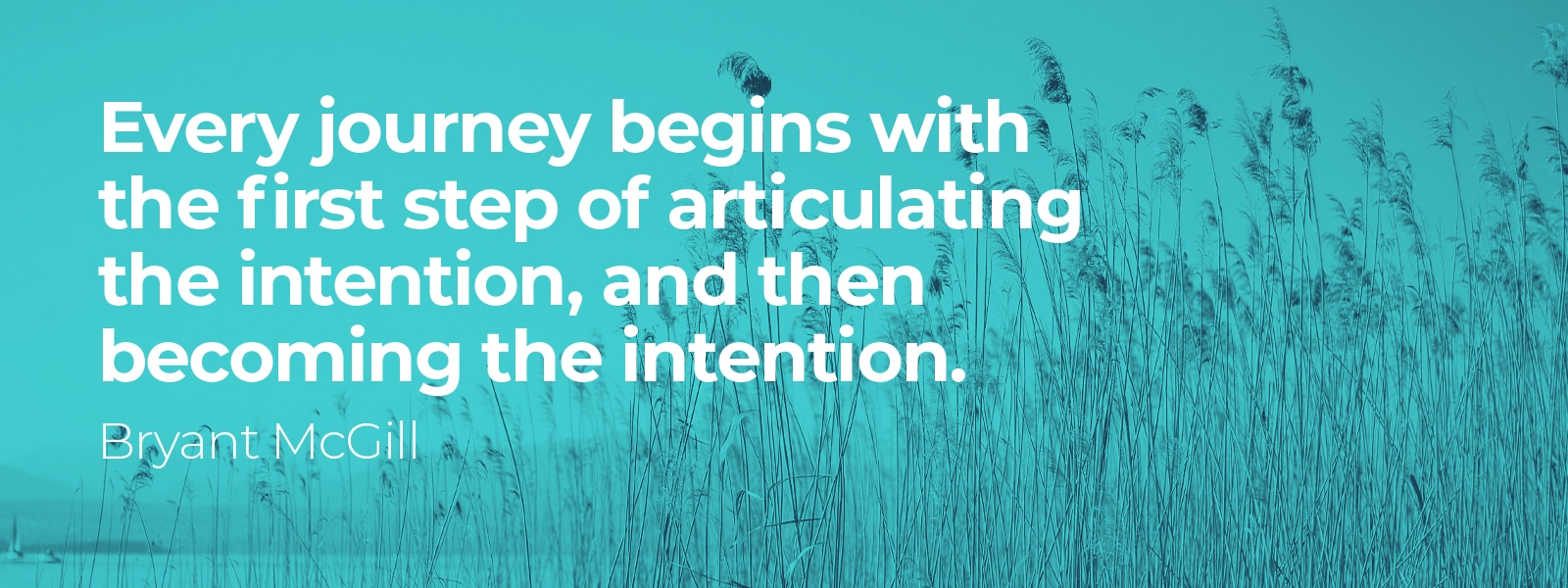 “Every journey begins with the first step of articulating the intention, and then becoming the intention.” — Bryant McGill
Now you’ve mastered awareness, you can begin honing your skills with intention. Here is the secret: when you intend for peace, you achieve it. Think about it; you can’t change what happens around you, but you can control how you react. If you would usually go into panic mode when running late for work, remember that your panic won’t change the reality of you being late. All it will do is put you in a stressed frame of mind for the rest of the day. But what if you woke up intending to be on time? Would you have left earlier, skipped the news or prepared your lunch the night before? How would your intentions change the outcome?
Maybe, it won’t. You’re still stuck in traffic, regardless of how intentional you were about leaving early. How can you use your intention now, to prepare for the consequence of being late? The mindful intention will keep your thoughts in check so that your body stays calm and capable of handling any scenario. Instead of being flustered, you have already thought of ways to make up the time, juggle your to-do list and turn a stressful day into a successful one. By remaining calm and intent on turning it around.
“Every journey begins with the first step of articulating the intention, and then becoming the intention.” — Bryant McGill
Now you’ve mastered awareness, you can begin honing your skills with intention. Here is the secret: when you intend for peace, you achieve it. Think about it; you can’t change what happens around you, but you can control how you react. If you would usually go into panic mode when running late for work, remember that your panic won’t change the reality of you being late. All it will do is put you in a stressed frame of mind for the rest of the day. But what if you woke up intending to be on time? Would you have left earlier, skipped the news or prepared your lunch the night before? How would your intentions change the outcome?
Maybe, it won’t. You’re still stuck in traffic, regardless of how intentional you were about leaving early. How can you use your intention now, to prepare for the consequence of being late? The mindful intention will keep your thoughts in check so that your body stays calm and capable of handling any scenario. Instead of being flustered, you have already thought of ways to make up the time, juggle your to-do list and turn a stressful day into a successful one. By remaining calm and intent on turning it around.
Why Mindfulness Works
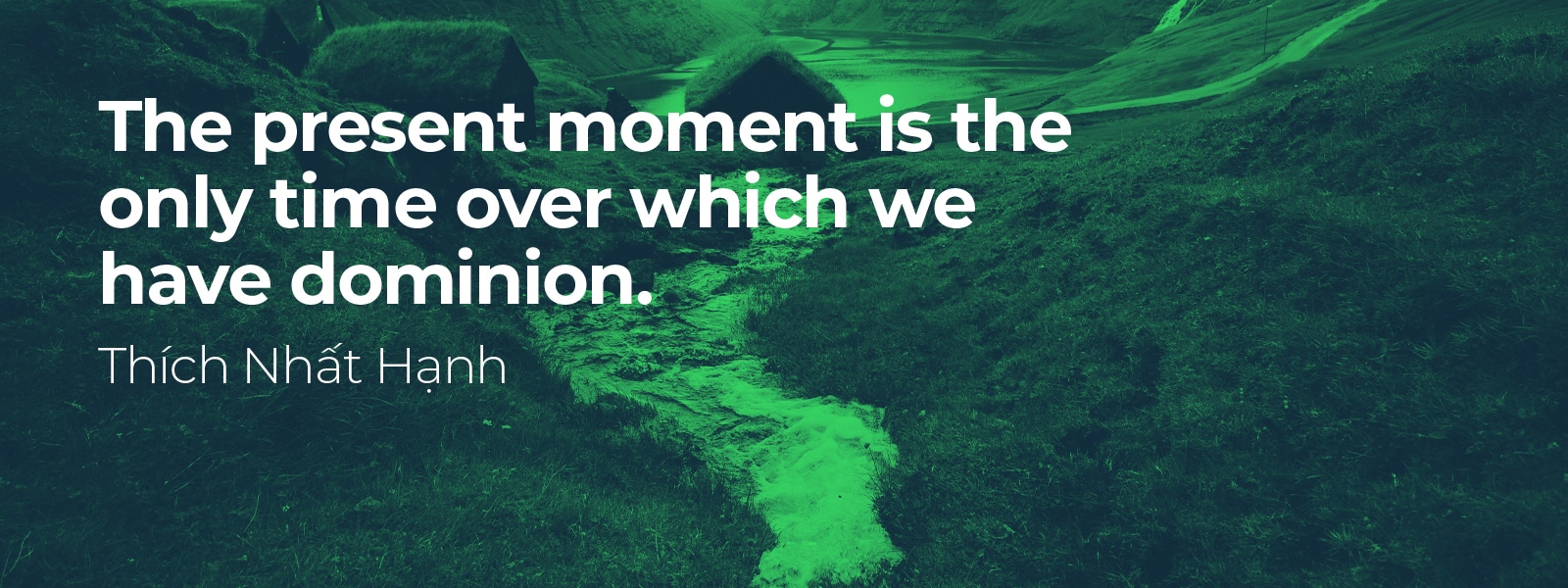 “The present moment is the only time over which we have dominion.” – Thích Nhất Hạnh
In 2018/2019, stress, depression or anxiety accounted for 44% of all work-related ill health cases and 54% of all working days lost due to ill health (Labour Force Survey). It’s no surprise that more people are looking for ways to have better control over their mental well-being. Stress can be reduced simply by sleeping better, which in turn can reduce chronic psychological and physical pain. All can be improved by mindfulness.
Your health is part of a complex system that is all connected, controlled and supported by the brain. Consequently, when we experience stress, the brain tells the heart it must prepare for fight or flight, sending adrenaline around the body and pumping blood faster to increase oxygen to your muscles.
The consequence of this? Sometimes dizziness, nausea, cramping and chronic fatigue, to name a few symptoms. It’s tiring work preparing for a showdown. Whilst these instinctive responses are necessary for survival, they don’t serve you well if you have an overactive mind. Luckily, you can ease this process and the anxiety involved by restructuring the processes that cause it. Mindfulness has been proven to lower blood pressure through muscle relaxation techniques, reduce the risk of heart disease, and prevent flare-ups of conditions triggered by stress.
“The present moment is the only time over which we have dominion.” – Thích Nhất Hạnh
In 2018/2019, stress, depression or anxiety accounted for 44% of all work-related ill health cases and 54% of all working days lost due to ill health (Labour Force Survey). It’s no surprise that more people are looking for ways to have better control over their mental well-being. Stress can be reduced simply by sleeping better, which in turn can reduce chronic psychological and physical pain. All can be improved by mindfulness.
Your health is part of a complex system that is all connected, controlled and supported by the brain. Consequently, when we experience stress, the brain tells the heart it must prepare for fight or flight, sending adrenaline around the body and pumping blood faster to increase oxygen to your muscles.
The consequence of this? Sometimes dizziness, nausea, cramping and chronic fatigue, to name a few symptoms. It’s tiring work preparing for a showdown. Whilst these instinctive responses are necessary for survival, they don’t serve you well if you have an overactive mind. Luckily, you can ease this process and the anxiety involved by restructuring the processes that cause it. Mindfulness has been proven to lower blood pressure through muscle relaxation techniques, reduce the risk of heart disease, and prevent flare-ups of conditions triggered by stress.
Neuroplasticity
You see, your brain is an organ that can change and adapt over time. This is called neuroplasticity, and it happens regularly. The brain learns new information every day, processing new ways to become more effective. Whenever we complete an activity, our brains make a mental note to store structural pathways and make connections between this task and other previously learnt subjects. Mindfulness practice sends a message to the brain that you can deal with the task at hand, regardless of whether it’s a situation you would normally feel stressed or anxious about (Positive Psychology). Moreover, when you focus your awareness without judgement or reaction, your brain triggers a new wave of signals to send around the body - calming hormones. Over time, this becomes more natural and you can learn to calm yourself at the click of a finger! This gives your whole body a health boost.Mindfulness & Learning
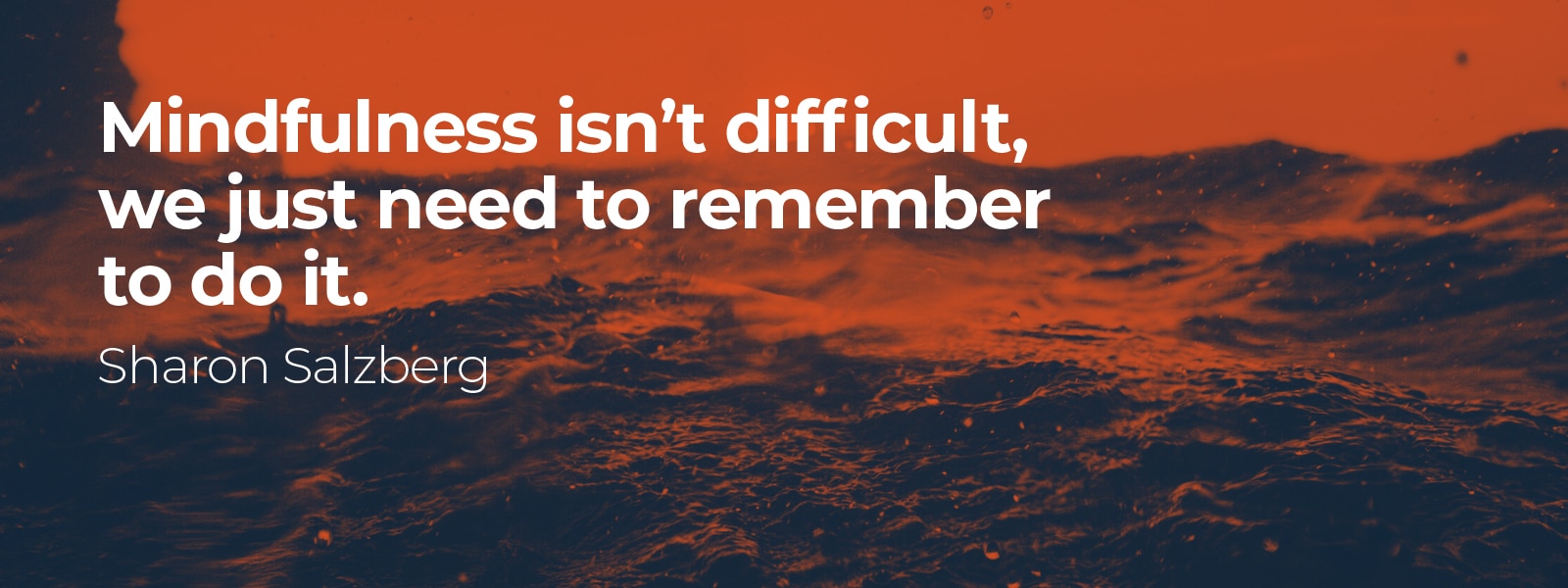 “Mindfulness isn’t difficult, we just need to remember to do it.” – Sharon Salzberg
Just 10 minutes of mindful meditation a day has been known to improve concentration and the ability to hold active information in one’s working memory. It simply helps the brain to become more efficient because you’re requiring fewer resources to complete a task. Therefore, mindfulness is a fantastic skill for students and lifelong learners. There is no limit to learning. Everybody can focus their mind on learning a new subject, but the problem is we live in a world full of distraction and temptation. As a student, practising mindfulness can be one of the best things you do for your personal growth and development.
“Mindfulness isn’t difficult, we just need to remember to do it.” – Sharon Salzberg
Just 10 minutes of mindful meditation a day has been known to improve concentration and the ability to hold active information in one’s working memory. It simply helps the brain to become more efficient because you’re requiring fewer resources to complete a task. Therefore, mindfulness is a fantastic skill for students and lifelong learners. There is no limit to learning. Everybody can focus their mind on learning a new subject, but the problem is we live in a world full of distraction and temptation. As a student, practising mindfulness can be one of the best things you do for your personal growth and development.
Some of the benefits for learners:
- Increased focus and ability to pay attention
- Better self-control with reduced impulsiveness
- Resilience to overcome challenges
- Improved creativity and expansive expression
- Better self-awareness: self-reflecting means you have a stronger understanding of your purpose, goals and capabilities.
Useful Apps & Resources
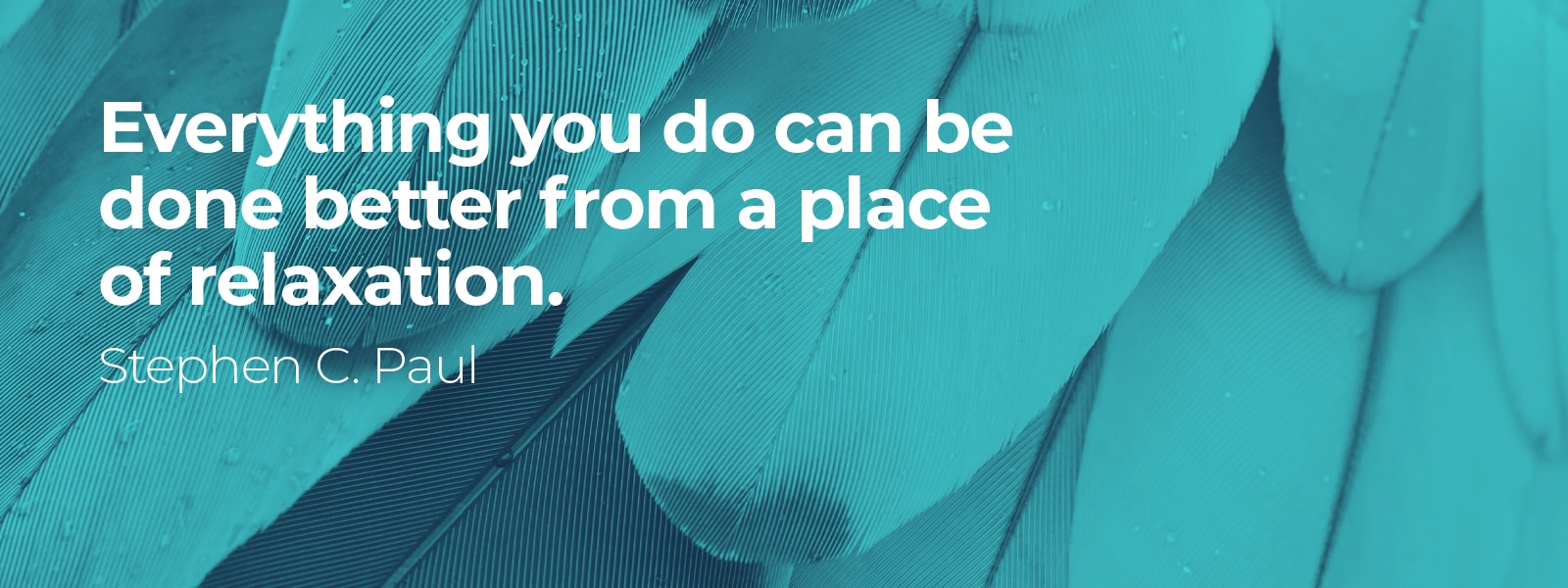 “Everything you do can be done better from a place of relaxation.” - Stephen C. Paul
We are big advocates of tools that assist learning and development. Guided meditation is recommended for beginners. Most guided meditations follow a similar format whereby the teacher will explain how the mind behaves during meditation and lead you through different techniques. It’s not easy trying to master something on your own... That’s why we recommend the following apps and online courses to assist you on your mindfulness journey!
“Everything you do can be done better from a place of relaxation.” - Stephen C. Paul
We are big advocates of tools that assist learning and development. Guided meditation is recommended for beginners. Most guided meditations follow a similar format whereby the teacher will explain how the mind behaves during meditation and lead you through different techniques. It’s not easy trying to master something on your own... That’s why we recommend the following apps and online courses to assist you on your mindfulness journey!
Calm
Calm is rated the no1 app for mindful practices. It’s comprised of six elements for meditation, sleep, music, movement, masterclasses and scenery, of which you select the section most relevant. There are video lessons and audio programmes taught by world-renowned experts, natural scenes and sounds to help you focus, and guided instructions to improve your overall wellbeing. You can trial Calm for free for one week! After that, either sign up to a monthly subscription for just £7.99, or access the app for the year at £29.99.Headspace
Headspace is ‘mindfulness made simple.’ The idea is that you take just a few minutes each day to cover the key lessons of meditation, and you choose a session most relevant to your mood, activity or goals. You decide on the length of time you want to spend meditating and the rest is a step-by-step process to follow. To give you an idea of how Headspace instructs you, they’ve written a blog on meditation for beginners. Try this: “With your eyes closed, start at the top of the head and mentally scan all the way down your body. As you scan, notice which parts feel relaxed or tense, comfortable or uncomfortable, light or heavy. Perform the scan again and again and use these observations to build a mental picture of how your body feels right now, in the present moment.”Buddhify
The central idea of Buddhify is that instead of finding the time for meditation, Buddhify finds the time for you. All their meditations are categorised on a wheel by activity or feeling. For example, walking, working, going to sleep or waking up, feeling stressed or feeling low. Buddhify also has a section for children, comprising of sixty meditations ‘lovingly made’ by some of the world’s leading teachers working in mindfulness. This covers categories such as feeling better, calming down and growing wisdom. You can access over 200 meditations for just £4.99 on Apple and £2.99 for Android devices, making Buddhify the most affordable mindfulness app.Forest
Whilst not strictly a meditation app, Forest helps you stay focused on the important things. When you need to concentrate, you plant a tree seedling on the app. As you complete the task, your tree will grow. But, if you leave the app halfway through your designated time, or check your phone’s notifications, your tree will die. Even opening your phone to check the growth of your tree will prompt messages such as ‘go back to work.’ It's perfect for those of you that appreciate visual rewards, allowing you to turn your hard work into a lush forest. Forest is free on Android or £1.99 on iOS, and it's also available on Chrome and Firebox browsers. Forest has partnered with a real-tree-planting organization called Trees for the Future. When people spend virtual coins to plant trees, the Forest team donate to Trees for the Future to plant real trees across the world. Over 700,000 trees have been planted to date. Therefore, users are both helping themselves and doing their bit for the planet.Courses
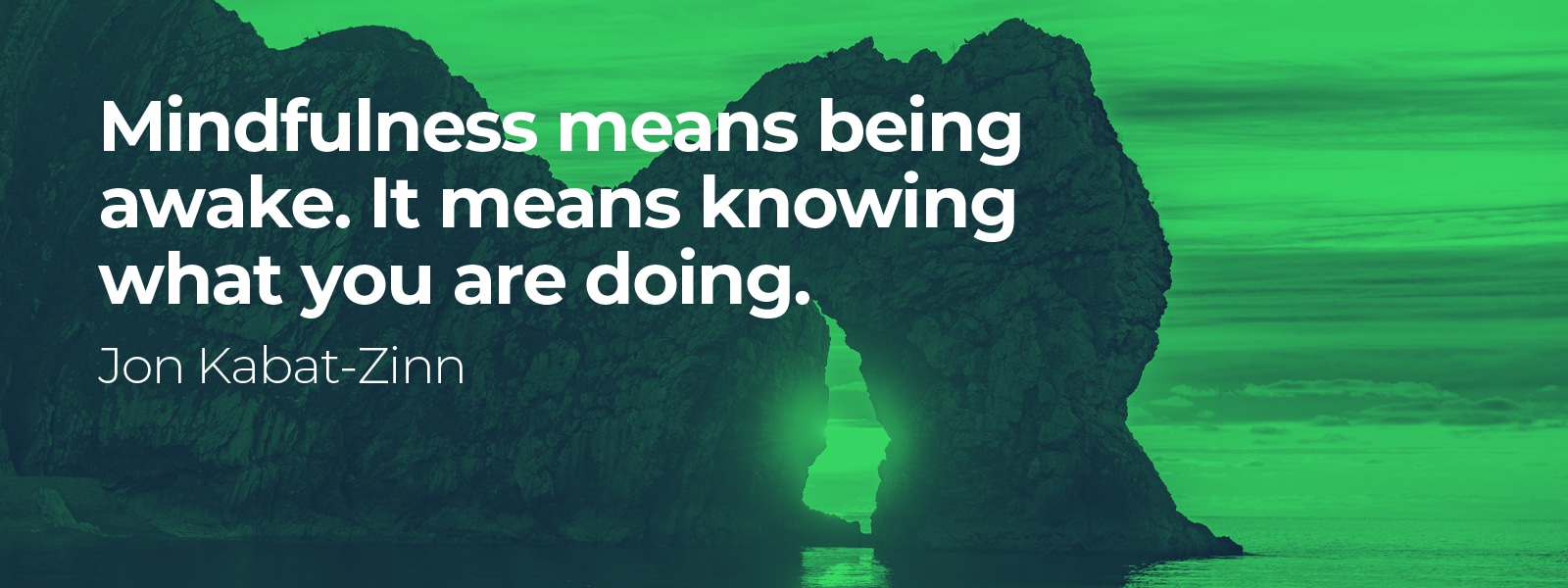 “Mindfulness means being awake. It means knowing what you are doing.”
~ Jon Kabat-Zinn
If you want to take your knowledge to the next level, a mindfulness qualification will benefit people working in a range of fields. It can both improve the way you work with colleagues, clients and the community, whilst also benefiting those around you. So, whether you’re a teacher with an overwhelming class, or you have a student that needs particular attention, you have the knowhow to handle it.
Our Mindfulness course covers its origins to its present therapeutic use, detailing the treatment of mental health conditions and key theories that have informed mindful practices. You will also learn how to start your own business from home so that you can qualify to run mindfulness workshops, 1-2-1 sessions and holistic therapies yourself.
Whatever route you take, we hope you achieve a more mindful way of living, starting today.
“Mindfulness means being awake. It means knowing what you are doing.”
~ Jon Kabat-Zinn
If you want to take your knowledge to the next level, a mindfulness qualification will benefit people working in a range of fields. It can both improve the way you work with colleagues, clients and the community, whilst also benefiting those around you. So, whether you’re a teacher with an overwhelming class, or you have a student that needs particular attention, you have the knowhow to handle it.
Our Mindfulness course covers its origins to its present therapeutic use, detailing the treatment of mental health conditions and key theories that have informed mindful practices. You will also learn how to start your own business from home so that you can qualify to run mindfulness workshops, 1-2-1 sessions and holistic therapies yourself.
Whatever route you take, we hope you achieve a more mindful way of living, starting today. 